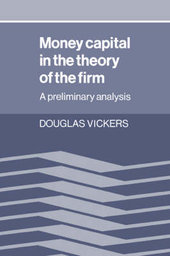
|
Money Capital in the Theory of the Firm: A Preliminary Analysis
Paperback / softback
Main Details
| Title |
Money Capital in the Theory of the Firm: A Preliminary Analysis
|
| Authors and Contributors |
By (author) Douglas Vickers
|
| Physical Properties |
| Format:Paperback / softback | | Pages:256 | | Dimensions(mm): Height 228,Width 153 |
|
| Category/Genre | Economic theory and philosophy |
|---|
| ISBN/Barcode |
9780521021920
|
| Classifications | Dewey:658.152 |
|---|
| Audience | | Professional & Vocational | |
|---|
| Illustrations |
Worked examples or Exercises
|
|
Publishing Details |
| Publisher |
Cambridge University Press
|
| Imprint |
Cambridge University Press
|
| Publication Date |
3 November 2005 |
| Publication Country |
United Kingdom
|
Description
The place of money capital in the theory of the firm has remained a relatively neglected question in traditions of economic analysis. In this highly integrative work, issues in production, pricing, capital investment and financial theory are brought to new levels of interdependence. Developing a three-part argument, Money Capital in the Theory of the Firm deals successively with the theoretical issues and analytic motivation, the neoclassical tradition and postclassical perspectives. In doing so, it presents a self-contained foundation in the basic structures of microeconomic analysis relating to optimize decision making in the firm and in the accounting concepts and statistical apparatus of probability theory relevant to the neoclassical aspects of the argument. Additionally, the book provides the essential mathematical development of such advanced topics as utility functions defined over stochastic arguments, the equilibrium theory of financial asset prices and yields, the cost of money capital, and investment decision criteria. This book makes an important contribution to the formation of new and analytically richer perspectives in the important area of economics it addresses. It will be of particular interest to those working in economic theory and microeconomics, and their advanced students.
|